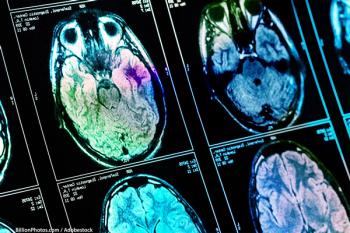
Oncology NEWS International
- Oncology NEWS International Vol 15 No 9
- Volume 15
- Issue 9
Modafinil Ups Cognitive Function in Brain Tumor Patients
Modafinil (Provigil) significantly improved cognitive function, mood, and fatigue in patients with brain tumors in a pilot study
ATLANTAModafinil (Provigil) significantly improved cognitive function, mood, and fatigue in patients with brain tumors in a pilot study, Thomas A. Kaleita, PhD, assistant professor of psychiatry at UCLA, reported at the American Society of Clinical Oncology 42nd Annual Meeting (abstract 1503). The agent is commonly used to treat sleep disorders, as an adjunct to antidepressant therapy, and to treat fatigue in multiple sclerosis. "The improvement in depression was quite a surprise for us," Dr. Kaleita said, noting that the depression scale was included in the study design merely as a tool for differentiating psychological depression from drug-related side effects.
Dr. Kaleita and colleagues tested modafinil in 30 patients who had a variety of primary malignant brain tumors or nonmalignant cerebral tumors: 18 high-grade gliomas, 10 low-grade gliomas, 14 frontal tumors, and 9 temporal tumors. Most patients had severe attention, memory, and fatigue problems. All had received some combination of neurosurgery, radiation therapy, and chemotherapy, and several were receiving chemotherapy during the study.
The first part of the study was double blind, with patients randomized between two different dose levels of modafinil for 3 weeks. After a 1-week period off drug, there was an 8-week open-label phase in which all patients received modafinil at what was determined to be each patient's optimal dose (range, 50 to 600 mg/d).
Open-Label Extension Phase
Dr. Kaleita reported data from the open-label extension phase, during which patients were assessed at baseline and after 12 weeks of modafinil. "Statistically significant and clinically meaningful outcomes were found at 8, 10, and 12 weeks after modafinil initiation," Dr. Kaleita said. Cognitive abilities improved by an average of 21%, mood by 35%, fatigue by 47%, and depression by 31% after 12 weeks of modafinil treatment.
Modafinil had a low incidence of adverse events. The most common were headache (43%), insomnia (2%), dizziness (23%), dry mouth (23%), depressed consciousness (16%), and nausea (13%). Dr. Kaleita pointed out that the incidence of headache was not surprising in this population, which has a high baseline rate of headache. He reported that side effects typically resolved after adjustments in the dose and scheduling of modafinil.
The next step, he said, is to determine long-term outcomes and to verify that modafinil does not create a tolerance or lose efficacy over time.
Articles in this issue
over 19 years ago
Exjade Gains Approval in EUover 19 years ago
President's Cancer Panel Assesses Progress in Two Areasover 19 years ago
Cognitive Rx Reduces Depression in Breast Ca Ptsover 19 years ago
Nurses Develop Evidence-Based Guidelines for Mucositisover 19 years ago
Anastrozole Therapy for Breast Cancer Affects Bone Healthover 19 years ago
Is Demand for Trial Subjects Outpacing Supply?over 19 years ago
Postchemo Disappearance of Liver Mets Doesn't Mean Cureover 19 years ago
Aromasin-Related Bone Loss Affected by Vitamin D LevelsNewsletter
Stay up to date on recent advances in the multidisciplinary approach to cancer.




































